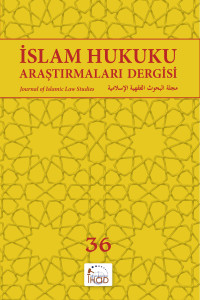An Important Exception Regarding To The Responsibility of Perpetrator in The Direct Destructions: The Case of Siāyah in The Hanafī School
Öz
The burden of responsibility to the perpetrator for direct causes (mubāshara)
is the general rule in the Hanafī school. Therefore, while the actual perpetrator of the
incident exists in an event of destruction, responsibility is not attributed to the person
who caused it. Also when the actual perpetrator who directly committed the damage
(mubāshir) and the person who caused it (mutasabbib) coexist in an event of destruction
that occurs, the responsibility is attributed to the mubāshir. Although the general rule is
as this case, there have occured some situations for which this rule has been abandoned
or has not been able to be operated in the Hanafī school. Causing damage to someone’s
property by making unfair complaints (siāyah/delation) to the cruel sultans, administrators or to someone in an administrative position is the most typical an example of this.
The question of who will be responsible for such wrongful act was first discussed in detail and systematically in the type of waqi’at books in the Hanafī school. Later, the views
that took place around this debate took place in the later standard texts of the school
(madhab). In this study, the responsibility of the people who caused this damage instead
of the actual perpetrator is discussed on the issue of siāyah.
Anahtar Kelimeler
Islamic Law Torts Direct Destruction Mubāshara Tasabbub Delation (siāyah)
Doğrudan İtlaf Hallerinde Failin Sorumluluğuna Dair Önemli Bir İstisna: Hanefî Mezhebinde Siâye Örneği
Öz
Doğrudan itlaf hallerinde sorumluluğun mübâşire yüklenmesi, Hanefi mezhebinde genel kuraldır. Bu yüzden bir itlaf hadisesinde olayın asıl faili ortada dururken
sorumluluk, sebep olan kişiye izâfe edilmez. Meydana gelen bir itlaf hadisesinde zararı
doğrudan gerçekleştiren asıl fail (mübâşir) ile buna sebep olan kişi (müsebbip) bir arada
bulunduğunda da sorumluluk, yine mübâşire yüklenmektedir. Mezhepteki yerleşik ve
genel kural (kıyas) böyle olmakla birlikte Hanefi mezhebinde bu kuralın işletilemediği
bazı durumlar olmuştur. Zalim sultan, idareci veya benzeri konumdaki kişilere haksız
şikâyette (siâye/jurnal) bulunarak birinin malının zarar görmesine sebep olma bunlardan biridir. Söz konusu haksız fiilde sorumluluğun kime ait olacağı meselesi, Hanefî
mezhebinde ilk önce vâkıât türündeki eserlerde detaylı ve sistematik bir şekilde tartışılmış, sonrasında bu tartışma etrafında cereyan eden görüşler mezhebin daha sonraki
hukuk metinlerinde yerini almıştır. Bu çalışmada, asıl fail yerine buna sebep olan kişilerin sorumluluğu siâye meselesi üzerinden hareketle ele alınmıştır.
Anahtar Kelimeler
İslam hukuku Haksız Fiiller Doğrudan İtlaf Mübâşeret Tesebbüb Siâye
Ayrıntılar
| Birincil Dil | Türkçe |
|---|---|
| Konular | Din, Toplum ve Kültür Araştırmaları |
| Bölüm | Araştırma Makaleleri |
| Yazarlar | |
| Yayımlanma Tarihi | 30 Ekim 2020 |
| Gönderilme Tarihi | 1 Mayıs 2020 |
| Yayımlandığı Sayı | Yıl 2020 Sayı: 36 |



